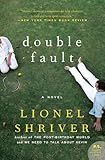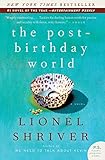1.
With her new novel, So Much for That, Lionel Shriver strengthens her already credible claim to the title of best living American writer. This won’t surprise her readers in the UK and much of Europe. In many countries, she is now regarded as one of our most important novelists. Americans, however, have been slower to find her. That’s okay. We were the same way with Faulkner and Poe. Nothing’s more American than not quite recognizing some of our most accomplished artists.
Besides, Shriver’s lack of recognition in the U.S. is relative. Her novels tend to be highly valued by the American critics who discuss them, and she has received strong reviews from that toughest of readers, Michiko Kakutani. The Post-Birthday World, Shriver’s last novel, was a New York Times bestseller, and I’m sure we’ll all start arguing about her breakthrough book, We Need to Talk About Kevin, as soon as the movie version comes out next year.
Still, we don’t need to wait for the theater screens to bring her to our full attention, especially when most of her novels are in print and easily available. Her work offers an appealing combination of qualities that seldom come together in a single writer. She couples the hardheaded social observation of Edith Wharton or George Eliot with a relentless psychological and artistic boldness that belongs more to the tradition of Melville or Dostoevsky. Exerting these different skills with immense confidence and penetration, Shriver is one of our great American originals.
2.
Shriver didn’t become well-known until she was in her late forties, and she had the talent and the will to deepen her work gradually, making the most of what must have been a trying period of obscurity. Born in 1957, she grew up in North Carolina, graduated from Columbia, and supplemented her fiction writing with a career as a journalist. She has written for The New York Times, The Wall Street Journal, and The Economist. More recently, she has become a columnist for The Guardian, and has divided her time between London and New York. In addition, she has lived all over the place: twelve years in Northern Ireland, a year in Kenya, and shorter stints in Israel and Thailand.

 The fierce independence of her writing seems to come from her compulsion to push her thoughts as far as she can take them, whether she is describing demographics experts in Africa or the pressures of professional tennis. Her two best early novels are Game Control and Double Fault. The main character in Game Control moves to Kenya so she can work on a family-planning project. She then falls in love with a man who believes that the solution to the world’s overpopulation problem is mass murder. Like all of Shriver’s novels, Game Control is intellectual and political in the best sense—not as a polemic, but as an examination of ideas in action, ideas as part of people’s lives. Here’s the main character scrutinizing some of her boyfriend’s research associates:
The fierce independence of her writing seems to come from her compulsion to push her thoughts as far as she can take them, whether she is describing demographics experts in Africa or the pressures of professional tennis. Her two best early novels are Game Control and Double Fault. The main character in Game Control moves to Kenya so she can work on a family-planning project. She then falls in love with a man who believes that the solution to the world’s overpopulation problem is mass murder. Like all of Shriver’s novels, Game Control is intellectual and political in the best sense—not as a polemic, but as an examination of ideas in action, ideas as part of people’s lives. Here’s the main character scrutinizing some of her boyfriend’s research associates:
Eleanor had already noticed their tendency to circulate the same informational tidbits, as in small incestuous communities where neighbors copy one another’s recipe for chicken balls. For example: that if we had dropped a bomb the size of the one that destroyed Hiroshima every day since 6 August 1945, we would still not have stabilized human population: she had heard that three times now. The repetition felt clubby, claustrophobic and it was boring.
Double Fault, Shriver’s tennis novel, came out in 1997. It traces the brief marriage of two low-level professional tennis players, and presents a merciless study of their collapsing relationship. It’s a cruel book, a Revolutionary Road for our times. The story is determined to show us the worst of both the husband and the wife, and it goes so far in this direction that it seems to have freed Shriver for the more generous and contradictory vision of human nature in her recent novels.
3.
 Starting with We Need to Talk About Kevin, Shriver entered her major phase as a writer. The book won the UK’s Orange Prize for 2005, and eventually sold over a million copies.
Starting with We Need to Talk About Kevin, Shriver entered her major phase as a writer. The book won the UK’s Orange Prize for 2005, and eventually sold over a million copies.
The narrator, Eva, lives out a nightmare: Kevin, her teenage son, goes on a killing spree at his high school and murders nine people. Shriver creates a bracing story of a mother who has always hated her son as intensely as she has always loved her husband and her young daughter. Eva can never be sure if her hatred helped turn Kevin into a murderer, or if she simply identified his savagery before anyone else did.
The novel follows Eva’s motherhood from Kevin’s birth to the time of the killings, and grows into a meditation on all kinds of things we don’t at first expect. We Need to Talk About Kevin plows deeply into anti-Americanism, the sacrifices women are expected to make for their children, the complexities of family life, and the dizzying questions of where individual responsibility begins and ends. Shriver has finally discovered a subject that makes full use of her ruthless psychological honesty. Eva’s narration is often brutally tough on herself and her son, and she slowly wins our trust—in part because she is smart enough to see that her version of events contains its own distortions, which are worked into the story with intriguing elegance. We Need to Talk About Kevin is an exhilarating book, alive with the author’s excitement at constantly going further than even she might have expected, and it gets better on repeated readings.
 Shriver’s follow-up novel, The Post-Birthday World, is her best-known work in America, since it was released by HarperCollins with great fanfare in 2007. It would have been easy for Shriver to continue in the sensationalistic vein of Kevin, but with typical stubbornness she chose to try something different. The Post-Birthday World is a meta-fiction love story. It takes us through two parallel plotlines, two possible lives for the same woman. In one plotline, she remains in a troubled marriage. In the other, she leaves her husband for another man. The chapters alternate between the first plotline and the second, and much of the novel is a formal tour de force, with nearly every sentence in the first story playing off against another sentence in the second. Shriver also brandishes an unexpected flair for writing about small pleasures—her characters’ love of snooker and home cooking, the satisfaction they take in their casual conversations. Yet the story always opens onto broader perspectives: the rise of terrorism in the background of our lives, the influence of our relationships on our careers, and the different possibilities that we create for ourselves and that are created for us by others.
Shriver’s follow-up novel, The Post-Birthday World, is her best-known work in America, since it was released by HarperCollins with great fanfare in 2007. It would have been easy for Shriver to continue in the sensationalistic vein of Kevin, but with typical stubbornness she chose to try something different. The Post-Birthday World is a meta-fiction love story. It takes us through two parallel plotlines, two possible lives for the same woman. In one plotline, she remains in a troubled marriage. In the other, she leaves her husband for another man. The chapters alternate between the first plotline and the second, and much of the novel is a formal tour de force, with nearly every sentence in the first story playing off against another sentence in the second. Shriver also brandishes an unexpected flair for writing about small pleasures—her characters’ love of snooker and home cooking, the satisfaction they take in their casual conversations. Yet the story always opens onto broader perspectives: the rise of terrorism in the background of our lives, the influence of our relationships on our careers, and the different possibilities that we create for ourselves and that are created for us by others.
4.
 So Much for That, the new Shriver novel, offers us her ferocious take on the American healthcare system. Shriver has always been good at the dark comedy of catastrophe. Here she faces a monster worthy of her clear-eyed attention to absurdity: the giant insurance-powered beast of medical costs that devastate two families in New York.
So Much for That, the new Shriver novel, offers us her ferocious take on the American healthcare system. Shriver has always been good at the dark comedy of catastrophe. Here she faces a monster worthy of her clear-eyed attention to absurdity: the giant insurance-powered beast of medical costs that devastate two families in New York.
Shep Knacker is a handyman whose wife is diagnosed with cancer. His best friend, Jackson, is a fellow employee whose daughter is slowly dying of a degenerative disorder. With methodical Catch-22 illogic, Shep is forced to give up all the money he has saved over the years to pay for the medical care that his grotesquely inadequate (but perfectly standard) insurance fails to cover. The treatments cause his wife nothing but agony, and provide little hope of curing her or even of extending her life for very long.
Meanwhile, Jackson and his wife carry on with their daughter, who has been ill since birth. Her disease plays an ongoing part in Jackson’s sometimes entertaining and sometimes destructive obsessions, from his compulsive spending to his frenzied hatred of the government and of nearly everything else in the world.
Health is the novel’s constant concern—not just physical and economic health but health in friendships, marriage, work, parenthood, and society at large. Shep is in some ways a modern Prince Myshkin, determined to do the right thing even if some people think this makes him foolish. One of the novel’s many thorny questions is whether Shep’s foolishness is truly admirable or a mistake in judgment, a personal flaw that condemns him to pointless pain. Shriver’s effects are hard to summarize because she builds them up so densely, thickening the texture of her world with each page. She makes our vision of Shep and the others depend not on glib generalities but on the total force of the novel’s accumulated impressions, with their many crosscurrents and subtleties.
We learn, for instance, that Shep associates his wife Glynis with the metalwork she makes, and the role of this metalwork becomes a continually deepening part of Glynis’s illness. Without giving away too much of the plot, the metalwork is at the core of Glynis’s shifting views of Shep, Shep’s shifting views of her, and both of their ideas about personal and public responsibility. Throughout the novel, Shriver is fascinated by our possible choices in the face of death and overwhelming injustice, by how we can and can’t control our lives in situations where all action seems quixotic.
5.
Shriver’s characters are always capable of surprising each other, and this is central to her rich sense of human relationships. She expertly captures the give-and-take between friends, and the ways our friends both annoy and beguile us. Shep changes Jackson and Jackson changes Shep, but the changes are intricate and unpredictable, and they fill the novel with an invigorating energy. You come away feeling that you’ve learned to see your own friendships more clearly and appreciatively.
A similar complexity is at work among all the characters, particularly Shep and Glynis. Early on, Glynis is a monument to rage, refusing the role of loveable victim. When Shep ponders Glynis’s reaction to Hurricane Katrina, we can see the efficiency of Shriver’s writing style, which is flexible enough to accommodate many different voices and situations yet still retains a distinctive sharp bounce, like a good topspin serve:
She loved watching destruction—the big bountiful houses of the sort she and her husband had never bought for themselves filled with acrid, oily water to the second floor. The stranded black matriarchs waving fruitlessly on rooftops for rescue that would never come, who now knew they were alone in the world and no one cared. Well, he could sense Glynis responding coolly, welcome to the club. Other people’s suffering did not disquiet her. Glynis did nothing but suffer, and if others suffered too that was only fair. She seemed gratified by the prospect that one whole city would not survive her… In a fell swoop of self-liberation, Glynis had relinquished her empathy for other people, defiantly reflecting back the very apathy about her own fate that she increasingly perceived in would-be well-wishers.
Shriver’s bold approach to the novel’s structure delays a series of revelations for us about Glynis, and about what the disease has done to her mentally and emotionally. For the first 300 pages of this 450 page book, we go back-and-forth solely between Shep’s perspective and Jackson’s. When we finally enter Glynis’s mind, the experience is heartbreaking and chilling, and clears the way for the book’s simultaneously tragic and jubilant climax. In all of her novels, Shriver works towards honest feeling the hard way—by pushing into places we’re afraid to go and making them not ugly but essential, an enrichment to our lives. She might just be the best we’ve got.








